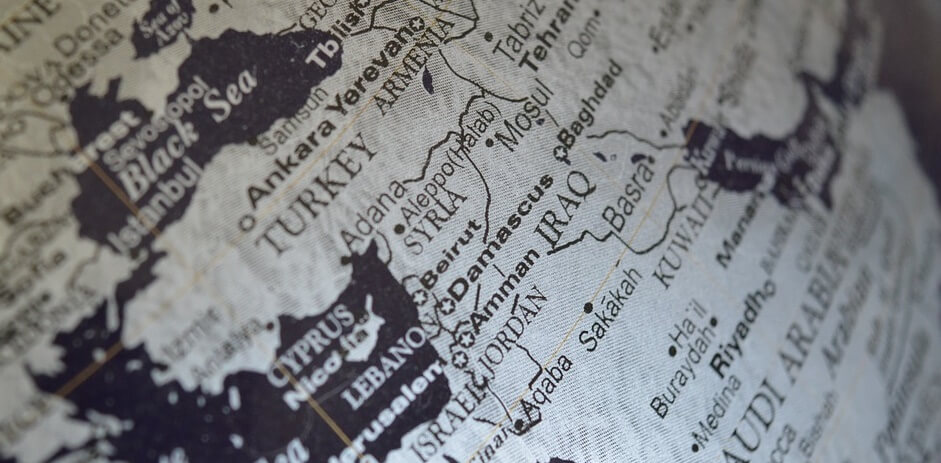
ISIS, IS, ISIL, or Daesh. There have been so many names to describe the supposed caliphate that has been responsible for the torture, imprisonment and death of thousands. The group have ‘vowed to cut out the tongues’ of anyone who uses the derogatory term Daesh. So, this is the term they shall be referred to as. Prior to the unrest in the Middle East, Syria was seen as an up and coming country with a blossoming economy. While wealth was still polarised, the middle classes were slowly growing. But now a number of major cities lie in disrepair, millions of Syrian’s continue to be kept in detention centres or refugee camps, and, although Daesh is losing ground, battles and warfare continue to be part of the country’s everyday life.
In 2010 in the Southern city of Deraa, some teenage boys were arrested and tortured for painting revolutionary symbols on the wall of their school. In Syria, pro-democracy protests in response to this quickly turned into unrest after the police find guns into the crowds of protesters. The violence and unrest triggered demands for the fall of the Assad government, and with violence escalating, the country soon descended into civil war. |Shortly after, Daesh began to affirm their power, fighting against the Syrian forces, they quickly gained ground in the region. In 2013, they renamed themselves, Islamic State of Iraq and Syria (ISIS). Daesh was founded in 2004 following the controversial Western invasion of Iraq in 2003, and the group grew steadily stronger. Abu Murab al-Zarqawi, originally part of Al Qaeda, founded the group based on their interpretation of Sunni Islamic beliefs and a desire to drive the West away. They believe themselves to be the army that was allegedly prophesied in the Qur’an. They believe themselves to be the saviours of Islam. Such claims of prophecy have resulted in Daesh attracting huge numbers of foreign fighters although
As Daesh’s foothold into their nation grew stronger, over 11 million Syrians began to flee the country. Risking everything to travel through Turkey and across the Mediterranean. Risking their lives for their dream of safety in Europe. Pictures of the lifeless body of two-year-old Alan Kurdi, washed up on a Turkish beach, bent viral, raising significant awareness of the plight of millions. Life for those who remained was brutal and oppressive, with more than 250, 000 Syrians losing their lives since the conflict began. Daesh implemented strict laws, based on their interpretation of Sharia laws and enforced my morality police. They killed, imprisoned, raped and enslaved thousands of people, particularly with this Yazidi communities. As of 2014, Western governments began leading air strikes and coalitions in an attempt to silence Daesh. The majority of the attacks have been led by the USA. However, a number of other countries have been included, such as Australia, Turkey and the UK. On the ground, the vast majority of the fighting has been left to the responsibility of the Kurdish People’s Protection units, YPG, and their female counterpart, YPJ. Both the YPG and the YPJ have won major victories across Syria, notably within the successful siege of Kobane. They are regarded as currently being the strongest force in the fight against Daesh. The KPG and the KPJ are fighting for a wider cause. The Kurdish people have been vilified, exiled, oppressed and excluded for generations. Although Kurds make up the 4th largest ethnic group in the Middle East, they do not have their own country. As a result of the conflict with Daesh, the Kurdish people have been able to take control over a small part of Northern Syria, unofficially known as Rojava. Rojava is not recognised by any government, yet it is the Kurdish people who have taken responsibility for leading and defending the polyethnic region. The People Protection Units sister group, YPJ, are committed to feminist values and principles regarding gender equality and the empowerment of women. This group of strong women have been critical during a number of key battles, including the Battle for Mosul. With Daesh’s power supposedly on the decline in Syria, the people have begun to return to the rubbles and mess that they once called home. But in April of this year, it was reported that more Syrian civilians had died that month as a result of US-led coalitions, than ISIS-led or Russia led. The civil war, unrest, abuses of human rights, torture, murder and rape that has been a feature of many people’s daily lives for some time, will have an impact. Daesh was created in response to the war-torn Iraq after the Western invasion. It is the responsibly of worldwide governments to ensure that this does not happen again, With IS supposedly continuing to operate in over 15 counties, the so-called caliphate continues to spread its message of hate.
